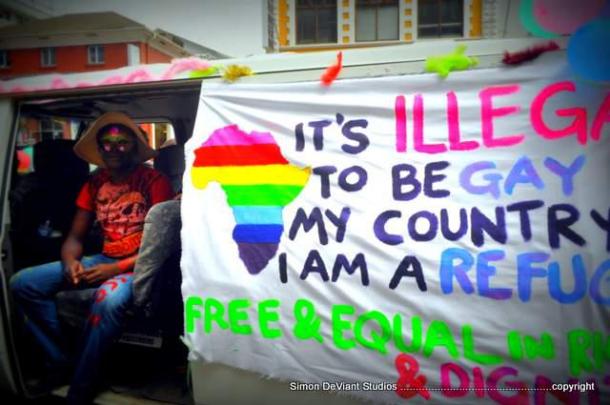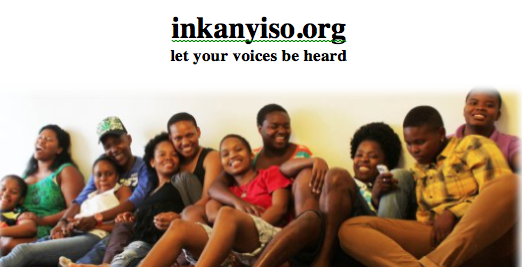By Oram, November 07, 2013.

Photo Simon Deviant SA
Lesbian and gay asylum seekers in the European Union can no longer be told to go home and pretend they’re straight. The European Union Court of Justice ruled Thursday, November 7th, that ‘voluntary discretion’ is not an acceptable rationale for rejecting asylum claims based on persecution grounded in sexual orientation. Asylum officials across the EU now more than ever need guidance in how to assess the credibility of a refugee’s declared sexual orientation in a way that is fair, well-reasoned, and drawn from empirical understanding of sexual orientation and gender identity.
The Court of Justice of the European Union (CJEU) issued a ruling today that will have profound implications for thousands of asylum seekers fleeing persecution based on sexual orientation. From now on, asylum seekers in the European Union cannot legally be turned away with the vague instruction to go home and avoid persecution by ‘concealing their orientation’, or to go home and ‘exercise restraint’ in expressing their sexual orientation. Now, as with religious minorities or political outcasts, refugees in European Union countries can apply for asylum and expect that their sexual orientation will be respected as an intrinsic part of their identity. The Court affirmed, “…a person’s sexual orientation is a characteristic so fundamental to his identity that he should not be forced to renounce it.”
ORAM – Organization for Refuge, Asylum & Migration – is profoundly relieved that, with this ruling, the CJEU has brought consistency to what was a country-by-country patchwork of practices, and enthusiastically endorses the Court’s decision to eliminate ‘voluntary discretion’ as a rationale for denying asylum claims based on sexual orientation.
In this ruling, the Court also has chosen to define criminalization of homosexuality in the country of origin as evidence of persecution per se, but only if the laws are actually enforced with prison terms. ORAM respects the concerns of European LGBTI (lesbian, gay, bisexual, transgender, intersex) human rights activists on this question of what constitutes persecution, and anticipates there will be vigorous debate about it in the months and years to come.
We point out that the 78 countries that criminalize same sex relations represent only a fraction of the nations where LGBTI people are in danger for their lives and safety because ordinary citizens persecute them while the State looks the other way. The worldwide persecution and marginalization of sexually and gender non-conforming people is a very real, under-reported social disease. Until there is a cure, we must at least provide safe haven.
The question remains whether European Union asylum officials are adequately prepared to deal with asylum claims based on sexual orientation and gender identity. No longer permitted to dismiss asylum claims with the idea that a gay or lesbian person can go home and practice ‘voluntary discretion’, asylum officials must instead work through the claims on their own merits. This places the obligation squarely on national authorities to fully and accurately assess the credibility of asylum claims based on sexual orientation.
In fact, we expect that the CJEU will issue a ruling on a related case in 2014 instructing adjudicators in how to assess the credibility of an asylum seeker’s declared sexual orientation. Will the CJEU’s minimum standards be enough to help European asylum adjudicators faced with complex individual cases assess the credibility of these claims fairly and knowledgeably? Without clear guidance and ongoing training, European Union asylum offices risk the embarrassment of last month’s public upset in the U.K., where the BBC reported that some asylum offices were demanding anecdotal and inappropriate “proof of gayness”. Quoted in this article, U.K. Home Office committee chairman MP Keith Vaz said, “”It is absurd for a judge or a caseworker to have to ask an individual to prove that they are lesbian or gay, to ask them what kind of films they watch, what kind of material they read.” [BBC UK, 10 October 2013, citation below]
Assessing credibility effectively across languages, cultures, and ages requires a reasonably sophisticated understanding of sexual orientation and gender identity. Neither the designations ‘lesbian, gay, bisexual, transgender, and intersex’ (LGBTI), nor the stereotypes associated with these identities, are sufficient filters for legally and ethically sound adjudication. Consider some of the nuances at play when an adjudicator encounters an asylum claim based sexual orientation or gender identity:
- Does the refugee even identify with the Western labels LGBTI? Those who don’t understand or claim these designations for themselves are still at risk of persecution for their sexual and gender non-conformity.
- Does the adjudicator understand the difference between sexual orientation and gender identity or gender expression?
- Does the adjudicator understand how to ask questions that draw out the narrative and emotional content of the asylum seeker’s story in ways that psychological and sociological research affirms will elicit the most relevant signals of sexual orientation?
- Is the language interpreter carefully chosen so as not to put the asylum seeker at risk of being ‘outed’ or shown disrespect by a compatriot who may be homophobic?
This challenge applies in all countries that receive asylum seekers. While we don’t expect this ruling to have an impact on the volume of gay asylum seekers, “Europe is a critical safe haven for asylum seekers of all kinds, including those who are LGBTI,” points out ORAM Executive Director Neil Grungras. According to the UN High Commissioner for Refugees (UNHCR), a staggering 74 percent of asylum claims registered in industrialized countries were lodged in Europe. The only two governments worldwide that currently track and report asylum claims based on sexual orientation and gender identity – Belgium and Norway – say that about 5 percent of their claims are based on persecution grounded in sexual orientation and gender identity. Given the scale of global persecution of LGBTI people, we at ORAM believe these statistics to be significantly understated. In other words, Europe will continue to receive thousands of these asylum seekers per year, even as thousands more cannot find the means to flee to a truly safe place.
It is the right and obligation of European Union members to provide safe haven to asylum seekers with credible claims. There is no reason, however, for adjudicators to be put in the position of guessing how to assess credibility. Experts, including ORAM, are helping the global protection community understand and respond to these refugees. We urge our colleagues to avail themselves of this expertise.
ORAM, for example, has provided highly-rated, and locally-customized sexual orientation and gender identity sensitization and adjudication training for UNHCR, NGO, and government refugee professionals everywhere from Sweden to Spain, Morocco to South Africa, Malaysia to Turkey. We partner with domestic LGBTI organisations to ensure that trainings are delivered with the utmost respect for local concerns, cultures and policies. We supplement our training with practical guides for asylum and refugee professionals, including – soon – a rigorously researched legal treatise on credibility assessment specifically for sexual orientation/gender identity applications.
Asylum experts do not need to struggle for an appropriate response to this 2013 ruling, nor to the expected 2014 CJEU ruling on credibility assessment. Organisations including ORAM have been working for years to build the foundation for fair, defensible, empirically-grounded adjudication of asylum and refugee applications based on sexual orientation and gender identity. With all respect: we can help.
References
- Click here for Court of Justice of the European Union 7 November 2013 judgment in joined cases C-199, C-200, and C-201
- Click here for Court of Justice of the European Union 7 November 2013 press release on the above cases
- UK asylum seekers ‘told to prove they are gay’ Justin Parkinson, BBC News, U.K. politics, 10 October 2013
ORAM Resources
- “Blind Alleys: The Unseen Struggles of Lesbian, Gay, Bisexual, Transgender and Intersex Urban Refugees in Mexico, Uganda and South Africa” is available at: www.oraminternational.org/en/publications
- Educational documentaries As I Am and No Place for Me, uncovering the struggles of LGBTI refugees in their own words, are available at: http://www.oraminternational.org/en/videos




















 PoochParkWear customizes hoodies and t-shirts, the good, the naughty, the in between, whether proud or quirky let them be seen. We also offer biker jackets, croc or pleather collars, a variety of collar charms, and our special Zinja beaded collars made by a co-op of HIV-positive South African women, the Sisonke women who weave the beads onto the collars.
PoochParkWear customizes hoodies and t-shirts, the good, the naughty, the in between, whether proud or quirky let them be seen. We also offer biker jackets, croc or pleather collars, a variety of collar charms, and our special Zinja beaded collars made by a co-op of HIV-positive South African women, the Sisonke women who weave the beads onto the collars.

Leave a Reply